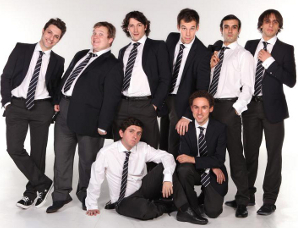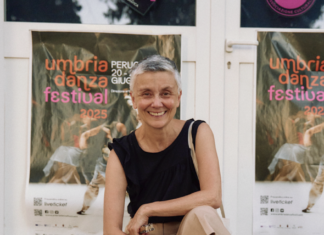
- photo: Lara Peviani
Leggi questo articolo in italiano
The Teatro India is not sold out, tonight. Still, someone added eight chairs. Four for each side of the stage. Now eight spectators are sharing that strange space with the actors: the stage, that now – without that “box effect” coming with the stalls perspective – seems immense and expanded. They now deal with a different proximity, rotating on their chairs in order not to miss any passage. Seen from this position, they are mute details and part of a frame; my “conventional” perspective grants them the privileges of a peripheral scenery. To the point that, step by step, I don’t even notice them anymore. Yet those eight people are the very fundamental elements that, by the very fact of sitting there, are fracturing the frontal view. And this is what The History Boys is about.
Written by Alan Bennett in 2004, this play has been offered to the gold book of the most prestigious juries, Italian Ubu National Prize not excluded: the staging by the couple Bruni-De Capitani has been awarded in 2011 as the Best New Play. A group of history pupils preparing for the Oxford and Cambridge entrance examinations deals with two teachers. In order to push up the school’s position in the rankings, to the 60-years old eccentric Hector (an histrionic and imposing Elio De Capitani) – who teaches literature and general culture and believes in knowledge for its own sake – the headmaster (played as a Disney-like character by Gabriele Calindri) decides to add a younger and combative history teacher, Irwin (Marco Cacciola, emerging victorious from the struggle with a very subtle and difficult character). Such (apparently) different methods will turn up to be pointed to a common outcome: facing the cultural apathy, is for one a romantic and melancholic venture, for the other a sort of exorcism against a conformist and prim common wisdom. A group of eight “actors under 30” deserved the Ubu Prize for this category for a really punchy work, a performance as excellent as Ida Marinelli‘s (winner for the best female non-leading role).
The merits of this great piece of theatre are difficult to measure. Bennett’s text (proficiently translated by Salvatore Cabras and Maggie Rose) goes like clockwork on a conscious and clever irony, showing a linguistic and semantic prowesses (through a wide range of quotations) to deal with weightier topics such as education, teaching, a society «that no longer has much use for pillars», and the ambition of a man as a social animal always on the point of curling up on a sofa of bourgeois (or simply human?) certitudes. And whilst the strong metal conductors seem to be sexuality, homosexuality and traditions, also these quickly fall like masks, giving way to one fundamental keyword: History.
Not only a school subject, but the subject of an analysis, a lens to see through. As well as any other great play this one is lead by a clear and genial intuition. The ultimate literary paradox that the perfect idea is the one you can easily get rid of to make room for a better one, manifests itself in the exquisitely private opportunity for a spectator to consider all the paths through which a fact can reach an historical discourse. As in a game. Or in an accurate scientific test. And these two activities have never been so close to each other. This play seems to suggest that human life (all its accidents considered) is the proof that history is conjugated in the subjunctive mood. Following a superb pace, the slightly melancholic plot takes shape on a set design which at the same time (depending on where the lights are up) is a classroom, the headmaster’s office, a locker room or a private angle in which a hectic puberty tills the ego, thanks to the brave Elizabethan style of the Teatro dell’Elfo company, which only needs actors and enough space for them to create.
Thus, as well as the language flies through flashbacks, inner voices, explosive musical sketches and irresistible fun, that genial intuition flies farther: to balance that juggling subjunctive mood is the point of view. Irwin teaches that for the “nouvelle histoire” (which is told as epistemological delirium and possibilist masturbation) the truth is just one among many variants; we are supposed to isolate it and, consequently, to analyze it. And, perhaps, to justify it.
The eight spectators sitting on stage remain part of the frame until the moment when the actors ceremoniously bow to them. We live in the “liquid society”, right? In which we can’t tell who is watching whom.
Sergio Lo Gatto
by Alan Bennett
translated by Salvatore Cabras e Maggie Rose
directed by Ferdinando Bruni e Elio De Capitani
cast Elio De Capitani, Ida Marinelli, Gabriele Calindri Marco Cacciola, Giuseppe Amato, Marco Bonadei, Angelo Di Genio, Loris Fabiani Andrea Germani, Andrea Macchi, Alessandro Rugnone, Vincenzo Zampa
light design Nando Frigerio
production Teatridithalia












